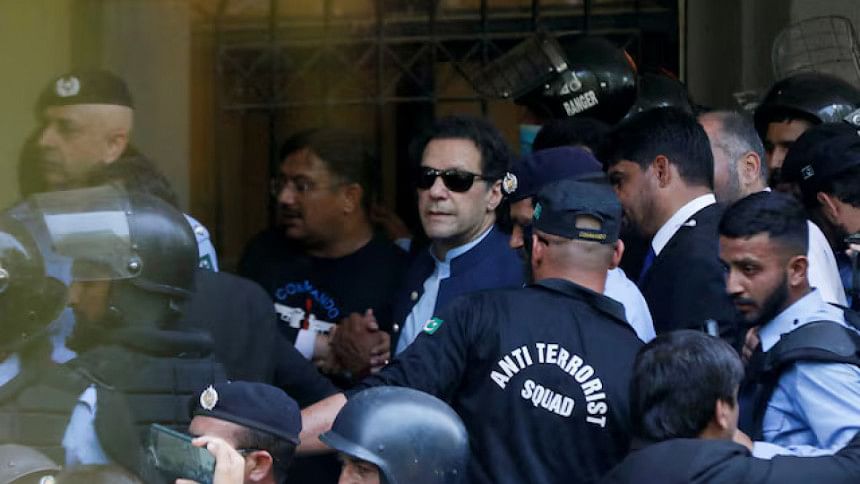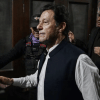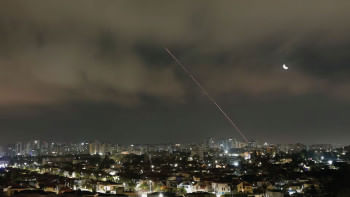Crushing dissent in Pakistan

The gory images of a bleeding Raoof Hasan, spokesperson for Imran Khan's party Pakistan Tehreek-e-Insaf (PTI), from a few days back were again a stark reminder of the autocratic way in which the Pakistani state under the control of its army is crushing political dissent. He was attacked on May 20 outside the office of a private TV channel by a group of four or five people, who have not been identified yet. Yet, PTI itself as well as many neutral observers are suspicious about the involvement of state spy agencies in the attack. Hasan is one of the most high-profile PTI leaders currently who are not in jail, and he is a well-respected civil society activist in his own right.
But the attack is just one of the ways in which the new regime, having the full backing of the army, has attempted to silence and sideline the opposition. Crushing dissent in Pakistan has a long history going right back to the period after its birth in 1947. The most egregious example was the massive atrocities committed in its ex-eastern wing in 1971, which led to the division of the country and the emergence of Bangladesh as an independent country. Since then, this pattern has continued during martial law periods as well as civilian eras with strong army control. Under PTI's regime, too, such crackdown against the present parties in power was common. It has taken a more ominous tone and higher levels since the new regime came to power in March this year. It has included jailing and disappearing opponents, filing dubious cases against them, blocking social media, passing laws to suppress free speech, and muffling the voices of political opponents on TV, in parliament and in real life.
Hundreds of PTI senior leaders, journalists and workers continue to languish in jail on dubious charges even before conviction. Imran Khan himself has been in jail for over six months, initially without any conviction. Later, he was convicted in three or four dubious cases, some of which have been overturned by higher courts. Appeal of the last two convictions against him are in their final stages and most independent legal observers think that they will be overturned in a few days. But they also think that the state will then arrest him in other cases as they cannot take the risk of releasing him given the political instability he could cause. Other PTI leaders and workers are often released after they are forced into jail to strike a deal with the state to announce their resignation from PTI in staged press conferences upon release. Dozens of party workers have simply disappeared, either kidnapped by the state agencies or gone into hiding given the fear of being arrested.
The social media platform X (formerly twitter) remains blocked in Pakistan for over two months as the government sees it as a primary vehicle for PTI to mobilise its workers and leaders and share critical information with them. While courts have ordered the government to reinstate X services, government agencies have simply ignored the court order. Laws and policies are being adopted to silence dissent. The provincial government in Punjab passed a defamation law last week which gives sweeping powers to government-appointed tribunals to punish people who criticise government functionaries and makes it difficult to file appeals against their verdicts. Another government circular bans journalists from reporting on court proceedings given the large number of cases against PTI leaders where proceedings are going against the government.
Newspapers and TV channels face pressure from the government and intelligence agencies against giving air time to PTI leaders or including news content favourable to PTI. Many pro-PTI journalists have been forced to leave the country or go underground. The attack on Raoof Hasan was part of this effort. There are increased restrictions on covering the court proceedings being held in jail against Imran Khan, and on his party leaders trying to meet him in jail.
While similar tactics were used by PTI against opposition parties when it was in power in 2018-22, the scale, speed and intensity of such actions is much higher now. Khan has gone to the extent of claiming that the crackdown against his party is similar to that against the Awami League in 1971 and may lead to the same consequence: division of the country. While the crackdown against PTI is highly condemnable, this comparison may be exaggerated given the scale of the atrocities that happened in 1971, which co-incidentally were committed under the command of a close relative of Imran Khan—the infamous General AK Niazi.
These abuses against PTI are happening in addition to the massive rigging against it in the February 2024 national elections. The situation is likely to get more heated in the coming months as the trials against Imran Khan and other leaders and those related to election-rigging reach their conclusion and the economic situation gets worse. Pakistan is about to enter a new IMF programme which may result in higher inflation, higher utility charges, and increased unemployment. Public discontent against the government as well as PTI's popularity will increase even though its own performance in power was poor. However, even those tactics are unlikely to lead to political instability or economic turnaround.
Meanwhile, Pakistan is also facing increased terrorist attacks from the Afghanistan-based terrorists as well as a heightened insurgency in Balochistan province, which has faced decades of atrocities like ex-East Pakistan did until 1971. Thus, Pakistan's prospects of finding peace and progress remain dim for the foreseeable future.
Dr Niaz Murtaza is an Islamabad-based political economist with a PhD from the University of California, Berkeley. He can be reached at [email protected]. His X handle is @NiazMurtaza2
Views expressed in this article are the author's own.
Follow The Daily Star Opinion on Facebook for the latest opinions, commentaries and analyses by experts and professionals. To contribute your article or letter to The Daily Star Opinion, see our guidelines for submission.

 For all latest news, follow The Daily Star's Google News channel.
For all latest news, follow The Daily Star's Google News channel. 










Comments